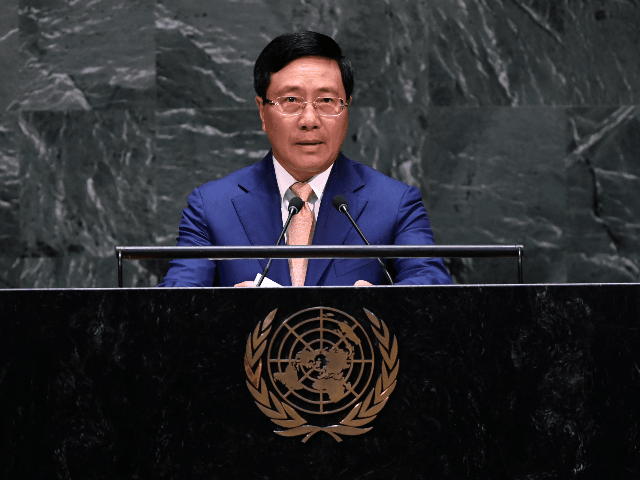Vietnam warned against China’s belligerence in the South China Sea at the U.N. General Assembly, concluding on Monday. However, Vietnam stood alone among nations whose territory China claims, in part due to the U.N. banning Taiwan from participating.
China claims nearly the entire South China Sea, including territory belonging to Vietnam, Brunei, the Philippines, Malaysia, and Taiwan. It has built environmentally damaging artificial islands on reefs in the Spratly and Paracel Island chains in waters that are legally Vietnamese and Filipino, and begun oil and gas exploration outside of its territory.
The South China Sea is one of the world’s most important trade routes, and rich in fisheries, fossil fuels, and other key resources. Environmental scientists have condemned China’s attempts to exploit those resources as damaging to the natural ecosystems present there.
As the General Assembly culminated on Monday, Brunei and Malaysia did not mention the South China Sea disputes in their speeches. The Philippines did mention the dispute, but only to claim that Beijing and Manila had come to an agreement on sharing resources in Philippine territory, which China has no legal right to. To appease China, the United Nations does not recognize Taiwan as a sovereign nation and does not allow it to participate in the General Assembly, though it has allowed “Palestine” to do so unchecked for years.
Vietnamese Foreign Minister Pham Binh Minh encouraged “relevant nations” to “exercise restraint” in respecting the sovereignty of their neighbors in the South China Sea during his speech to the General Assembly on Saturday. While he did not name China – nominally a fellow communist ally – Hanoi has only had public issues with Chinese ships illegally entering Vietnamese waters and intimidating or attacking Vietnamese sailors in their domestic territory.
“It is alarming that narrowly interpreted national interests are chosen over common values; big power politics, coercion, competition, and confrontation are favored over cooperation, dialogue, and respect for international law,” Pham lamented. “The consequential reductions in political commitment and resources have impacted the efficiency and reduction of multilateralism.”
On the issue of the South China Sea itself, the Vietnamese foreign minister insisted that all nations should respect international law and the United Nations Convention on the Law of the Sea (UNCLOS), which grants states sovereignty over waters up to 12 nautical miles from its shores.
“International law is the foundation of equal relations among states. Our actions must be in line and guided by respect for international law. Vietnam believes that respect for international law is the most effective measure to prevent conflicts and to seek sustainable solutions for disputes,” Pham said. “We urge relevant parties in the South China Sea to respect international law.”
“Linking the Indian and Pacific Oceans, the South China Sea is strategically important to peace, security, and prosperity in the Asia-Pacific region. Efforts by relevant parties have yielded positive outcomes in settling differences and disputes,” he continued. “However, Vietnam has on many occasions voiced its concerns over the recent complicated developments in the South China Sea, including serious incidents that infringe upon Vietnam’s sovereignty, rights, and jurisdiction in our maritime zones as defined by UNCLOS.”
“Relevant states should exercise restraint and refrain from conducting unilateral acts, which might complicate or escalate tensions at sea, and settle disputes by peaceful means in accordance with international law,” he concluded.
The only state which Vietnam has officially lodged protests against in the region of that nature is China.
Philippine Foreign Affairs Secretary Teodoro Locsin, Jr., did mention China in his speech on Saturday, but only to praise the Communist Party for agreeing to let the Philippines use its exclusive economic zone without using its military might to destroy the country.
“We are negotiating a code of conduct with China in the South China Sea” after “incidents,” Locsin said. “So far we have had no interference in the joint exploration and development of oil and gas … the code of conduct is a code of reality, the reality of the proximity of the soon to be biggest economy in the world.”
Locsin’s boss, President Rodrigo Duterte, has repeatedly refused to challenge China even though the Philippines won an international legal case in 2016 against Beijing for its illegal occupation of the South China Sea. That case was brought to the Permanent Court of Arbitration at The Hague prior to Duterte taking office, and Duterte has refused to bring it up.
In remarks Monday, Duterte spokesman Salvador Panelo insisted of China, “The president still trusts them.”
Mahathir Mohamad, the anti-semitic prime minister of Malaysia, did not mention the South China Sea in his speech on Saturday. Instead, he spent a significant portion of his speech condemning Israel, and later admitted in an interview that he was afraid of challenging China in public “because China is beneficial to us.”
Brunei’s envoy spoke on Monday and also did not bring up the South China Sea dispute, or challenge China in any way.

COMMENTS
Please let us know if you're having issues with commenting.